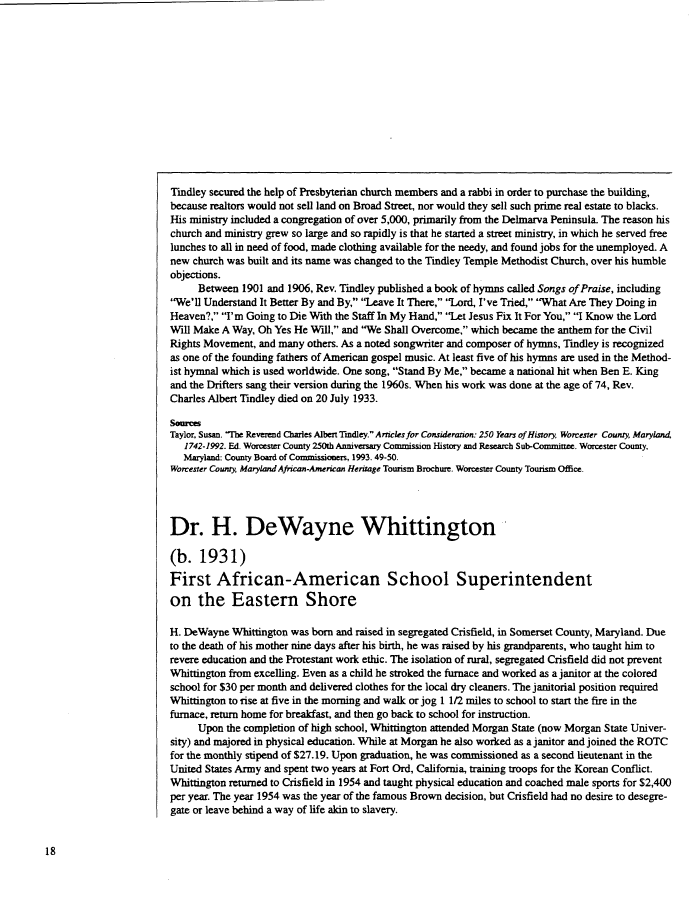 |
||||
|
TASK FORCE TO STUDY THE HISTORY AND LEGACY OF SLAVERY IN MARYLAND (Final Report) 1999/12/31 MdHR 991422 MdHR 991422, Image No: 378 Print image (80K) |
 |
||||
|
TASK FORCE TO STUDY THE HISTORY AND LEGACY OF SLAVERY IN MARYLAND (Final Report) 1999/12/31 MdHR 991422 MdHR 991422, Image No: 378 Print image (80K) |
| Tindley secured the help of Presbyterian church members and a rabbi in order to purchase the building, because realtors would not sell land on Broad Street, nor would they sell such prime real estate to blacks. His ministry included a congregation of over 5,000, primarily from the Delmarva Peninsula. The reason his church and ministry grew so large and so rapidly is that he started a street ministry, in which he served free lunches to all in need of food, made clothing available for the needy, and found jobs for the unemployed. A new church was built and its name was changed to the Tindley Temple Methodist Church, over his humble objections. Between 1901 and 1906, Rev. Tindley published a book of hymns called Songs of Praise, including "We'll Understand It Better By and By," "Leave It There," "Lord, I've Tried," "What Are They Doing in Heaven?," "I'm Going to Die With the Staff In My Hand," "Let Jesus Fix It For You," "I Know the Lord Will Make A Way, Oh Yes He Will," and "We Shall Overcome," which became the anthem for the Civil Rights Movement, and many others. As a noted songwriter and composer of hymns, Tindley is recognized as one of the founding fathers of American gospel music. At least five of his hymns are used in the Methodist hymnal which is used worldwide. One song, "Stand By Me," became a national hit when Ben E. King and the Drifters sang their version during the 1960s. When his work was done at the age of 74, Rev. Charles Albert Tindley died on 20 July 1933. Sources Taylor, Susan. The Reverend Charles Albert Tindley." Articles for Consideration: 250 Years of History, Worcester County, Maryland, 1742-1992. Ed. Worcester County 250th Anniversary Commission History and Research Sub-Committee. Worcester County, Maryland: County Board of Commissioners, 1993.49-50. Worcester County, Maryland African-American Heritage Tourism Brochure. Worcester County Tourism Office. Dr. H. DeWayne Whittington (b. 1931) First African-American School Superintendent on the Eastern Shore H. DeWayne Whittington was bom and raised in segregated Crisfield, in Somerset County, Maryland. Due to the death of his mother nine days after his birth, he was raised by his grandparents, who taught him to revere education and the Protestant work ethic. The isolation of rural, segregated Crisfield did not prevent Whittington from excelling. Even as a child he stroked the furnace and worked as a janitor at the colored school for $30 per month and delivered clothes for the local dry cleaners. The janitorial position required Whittington to rise at five in the morning and walk or jog 1 1/2 miles to school to start the fire in the furnace, return home for breakfast, and then go back to school for instruction. Upon the completion of high school, Whittington attended Morgan State (now Morgan State University) and majored in physical education. While at Morgan he also worked as a janitor and joined the ROTC for the monthly stipend of $27.19. Upon graduation, he was commissioned as a second lieutenant in the United States Army and spent two years at Fort Ord, California, training troops for the Korean Conflict. Whittington returned to Crisfield in 1954 and taught physical education and coached male sports for $2,400 per year. The year 1954 was the year of the famous Brown decision, but Crisfield had no desire to desegregate or leave behind a way of life akin to slavery. 18 |